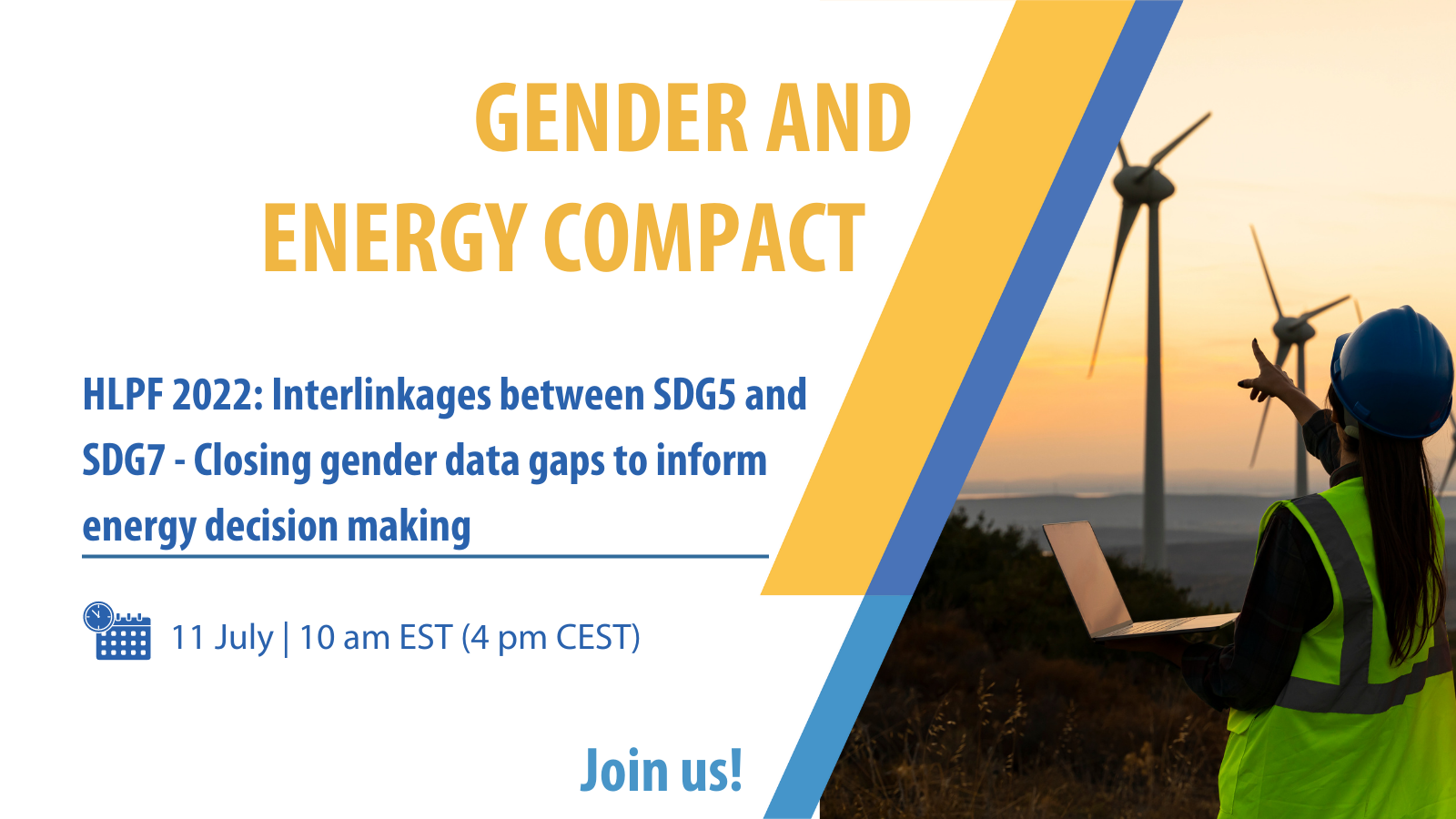At this year’s High Level Political Forum, ENERGIA, UNIDO and UNDESA co-hosted a side event titled “Interlinkages between SDG5 and SDG7: Closing gender data gaps to inform energy decision making”. This event was particularly timely and relevant considering that during this year’s Forum member states and the international community conducted an in-depth review of four Sustainable Development Goals, including SDG5 on gender equality and the SDG7 TAG Policy Brief highlighted the dearth of gender data and lack of consistency in data collection.
Gender equality and the empowerment of all women and girls are universal goals in their own right, as explicitly set out in SDG 5 in the United Nations Agenda 2030 for Sustainable Development. The UN Resolution, adopted during the High-Level Dialogue in 2021, recognized that sustainable energy access and its deployment can be both improved and accelerated by gender equality and the empowerment of all women and girls. The Resolution called upon governments, the United Nations development system, and other stakeholders to take actions to mainstream gender equality in policies and programs. Yet, SDG7 is one of the six SDGs–out of the seventeen–with no gender-specific indicators, according to UN Women.
The side event aimed at firstly raising awareness about the gender data gap in the energy sector and secondly, to present various initiatives that work in this direction. The event started with welcoming remarks of Paul Mbuthi, Deputy Director of Renewable Energy, Ministry of Energy Kenya, who emphasized that data is needed in order to create and implement effective policies and expressed the country’s continued support for the Gender and Energy Compact. Additionally, Hans Olav Ibrekk, Special Envoy, Climate and Security from Norway contributed with his opening remarks and expressed his concerns about the achievement of SDG7, let alone in a just and inclusive way. As he demonstratively noted: “We all know that we are falling short of gender inclusion, and we need to do better.”
To outline the issue of gender data gaps in the energy sector, Elizabeth Cecelski, Energy Access and Gender Expert from ENERGIA and member of the SDG7 Technical Advisory Group, presented the findings of the SDG7 Technical Advisory Group TAG Policy Brief on data interlinkages between SDG5 and SDG7 to which many Gender Energy Compact stakeholder contributed. In her own words, “there has been little coordination [in this field and] the most important recommendation of the policy brief is to establish a platform and partnership to collect and expand gender and energy data, as well as a technical working group on gender and energy interlinkages that would connect with key partners.” She also outlined four key areas where progress made in closing gender gaps needs to be measured through appropriate indicators, namely: (1) energy poverty, (2) empowerment and leadership, (3) entrepreneurship, and (4) enabling environments.
The panel discussion section of the event introduced the initiatives from several stakeholders that work in closing the gender data gaps. Starting with the Gender Equality Initiative from the Energy Community, Irina Lazzerini, Senior Sustainable Energy Expert, expressed that “the right set of indicators will help us understand the barriers that women face [and] that improving the collection of sex-disaggregated data is critical to addressing gender inequalities in the energy sector.”
Two experts from the World Bank’s Energy Sector Management Assistance Program (ESMAP), Nathyeli Yethzi Acuna Castillo, Gender Specialist, and Sharmila Bellur, Sustainable Energy Consultant, presented the Regulatory Indicators for Sustainable Energy Initiative (RISE). On challenges and way forward, Nathyeli stressed that “we know that women are less represented in the labour force, but we need to understand what is going on in the pipeline,” while Sharmila outlined that “data is not equally available; stakeholders need to be interviewed [and] many stakeholders lack the mandate to collect gender data.”
Next, Papa Alioune Seck, Chief of Research and Data at UN Women shared the highlights of the Women Count Program and stressed the importance of financing and investment. In his opinion, “only 20% of the data needed to measure gender-environment related SDGs are available [and] we need to refine our approach and conduct more data collection and analysis.”
Per Anders Widell presented the International Energy Agency’s Gender Data Explorer and Policy Manual, in which he reiterated the parallel between the SDG7 TAG’s and IEA’s respective work. He explained that the initiative was developed for usage in the public sector and in mostly European contexts. However, he also emphasized the similarities of challenges faced by each respective initiative and endorsed further collaboration.
To close the panel discussion, Martin Niemetz, Sustainable Development Expert on Energy from UNDESA, elaborated on the work of the SDG7 Technical Advisory Group, with a special focus on its meeting held in Oslo earlier this year, where policy briefs regarding interlinkages with other SDGs namely SDG4 (education), SDG5 (gender equality) and SDG15 (life on land) were presented.
Katharina Proestler, Project Coordinator and Gender Focal Point at the Department of Energy of UNIDO, wrapped up the event and underlined the need for and importance of collaboration and partnership and welcomed the recommendation for the creation of a partnership and/or platform, comprising of the above initiatives to enable knowledge sharing, diffusion and collaboration. As the moderator of the event, Sheila Oparaocha, Director of the ENERGIA Network, put it: “it is of high importance not to work in silos, but create partnerships and learn from each other.” The Gender and Energy Compact serves this purpose and encourages all organisations, stakeholders, the private sector, and institutions to join the Coalition in shaping a just energy future.
The recording of the event can be accessed here.







